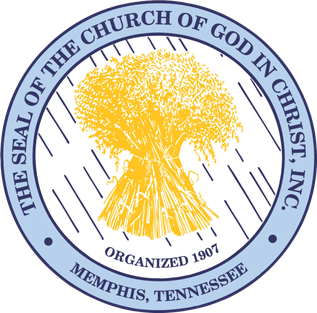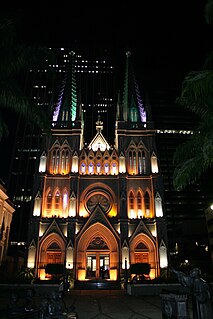
Pentecostalism or classical Pentecostalism is a Protestant Christian movement that emphasises direct personal experience of God through baptism with the Holy Spirit. The term Pentecostal is derived from Pentecost, an event that commemorates the descent of the Holy Spirit upon the followers of Jesus Christ, and the speaking in "foreign" tongues as described in the second chapter of the Acts of the Apostles. In Greek, it is the name for the Jewish Feast of Weeks.

The Church of God in Christ (COGIC) is a Holiness–Pentecostal Christian denomination. COGIC is the largest Pentecostal denomination in the United States. Although an international and multi-ethnic religious organization, it has a predominantly African-American membership in the United States. The international headquarters is in Memphis, Tennessee. The current Presiding Bishop is Bishop John Drew Sheard Sr., who is the Senior Pastor of the Greater Emmanuel Institutional Church of God in Christ of Detroit, Michigan. He was elected as the denomination's leader on March 27, 2021.

In China, house churches or family churches, are Protestant assemblies in the People's Republic of China that operate independently from the state-sanctioned Three-Self Patriotic Movement (TSPM) and China Christian Council (CCC) and came into existence due to the change in religious policy after the end of the Cultural Revolution in the early-1980s.

The Assemblies of God (AG), officially the World Assemblies of God Fellowship, is a group of over 144 autonomous self-governing national groupings of churches that together form the world's largest Pentecostal denomination.
The Chinese Independent Churches are a major category of churches of Chinese people.
Pentecostalism has grown in India since its introduction in the early twentieth century. Several Pentecostal missionaries who had participated in the Azusa Street Revival visited Kerala from 1909 onwards. During the 1920s the missionary Robert F. Cook established the Indian branch of the Church of God, based in Kerala. Two other churches founded around this time were Cylone Pentecostal Mission (CPM) later became The Pentecostal Mission, in the 1980s, founded in Sri Lanka by the Indian evangelist Pastor Paul, and later brought to India; and the Indian Pentecostal Church of God, set up by K.E. Abraham after he split from the church founded by Cook. A later foundation, in 1953, was the Sharon Fellowship, which runs the Sharon Women's Bible College. Many of the Pentecostal churches in India are represented in the Assemblies of God in India.
The Indian Pentecostal Church of God (IPC) is the largest Pentecostal organisation in India with Wesleyan influences. It has over ten thousand congregations around the world. Its organisational headquarters is at Hebronpuram, Kumbanad, Kerala, India. Many current IPC preachers promote the word of faith gospel. IPC also distances itself from TPM, which according to IPC is a heretical movement as it promotes legalism, although the IPC has come under scrutiny for promoting legalism as well. The church has a tendency to stray from ecumenism, as several of its leaders often denounce high church liturgy as a method of worship, instead embracing low church contemporary worship. It believes in Baptism of the Holy Spirit as separate event and does not believe in cessationism.

Religion in Taiwan is characterised by a diversity of religious beliefs and practices, predominantly those pertaining to the continued preservation of the ancient Chinese culture and religion. Freedom of religion is inscribed in the constitution of the Republic of China (Taiwan), and ranks high at 9.2 on the Freedom Scale in 2018 according to the World Bank.

The Assembleias de Deus are a group of Pentecostal denominations in Brazil founded by Daniel Berg and Gunnar Vingren, who came to Brazil as missionaries from the Swedish Pentecostal movement. The Assembleias de Deus are related to the worldwide Pentecostal movement, and some groups are affiliated with the Assemblies of God. Currently, the organization is one of the largest Protestant denominations worldwide.

Protestantism in Brazil began in the 19th century, and grew in the 20th century. The 2010 Census reported that 22.2% of the Brazilian population is Protestant, while in 2020 the percentage was estimated to have risen to 31% of the population, meaning over 65 million individuals, making it one of the world's largest concentrations of Protestants. Brazilian Protestantism is primarily represented by Evangelical Protestant and Pentecostal churches, and a smaller proportion of Baptists. The remainder is made up of Lutherans, Adventists, Presbyterians and other mainline Protestant traditions.

The Assemblies of God USA (AG), officially the General Council of the Assemblies of God, is a Pentecostal Christian denomination in the United States founded in 1914 during a meeting of Pentecostal ministers at Hot Springs, Arkansas. The Assemblies of God is a Finished Work Pentecostal denomination and is the U.S. branch of the World Assemblies of God Fellowship, the world's largest Pentecostal body. With a constituency of over 3 million, the Assemblies of God was the ninth largest Christian denomination and the second largest Pentecostal denomination in the United States in 2011.

The Lutheran Church of China was a Lutheran church body in China from 1920 to 1951. It was established as a result of the consultations between the various Lutheran missionary bodies in China that was initiated during the China Centenary Missionary Conference held in Shanghai in 1907. The church survived as an organised body after the Chinese Civil War but was gradually absorbed into the Three-Self Patriotic Movement of the Protestant Churches in China.

Christianity was first introduced to Thailand by European missionaries. It represents 1.17% of the national population, which is predominantly Buddhist. Christians are numerically and organizationally concentrated more heavily in the north, where they make up an estimated 16% of some lowland districts and up to very high percents in tribal districts.

The Taiwan Lutheran Church is one of the six Lutheran bodies in Taiwan. It currently has 80 mission sites nationwide with a total of 11,422 baptized members.
The Swiss Pentecostal Mission is the largest Pentecostal Christian denomination in Switzerland. Officially known in English as the Pentecostal Assemblies of Switzerland, it is the Swiss branch of the Assemblies of God, the largest Pentecostal denomination in the world. In 2013, the denomination had 10,000 adherents in 66 churches, and it operated a conference center in Emmetten.
The Norwegian Pentecostal Church, is a Christian organization that conducts mission operations and social work in many countries. The Pentecostal Foreign Mission of Norway is the collective term for Norwegian Pentecostal involvement in Christian missions, i.e. outside Norway. Social work, pastoral work, and evangelism have been its missionaries' most important work.

Taiwan has a Christian minority, making up about 3.9% of its population. Roughly half of Taiwan's Christians are Catholic, and half Protestant. Due to the small number of practitioners, Christianity has not influenced the island nation's Han Chinese culture in a significant way. A few individual Christians have devoted their lives to charitable work in Taiwan becoming well known and well liked for example George Leslie Mackay (Presbyterian) and Nitobe Inazō.
The Reformed Presbyterian Church in Taiwan was officially established in 1971 when the First Presbytery was formed as a result of the union of various conservative Presbyterian and Continental Reformed congregations planted by various missionary groups. Its origin could be traced back to the 1950s when the very first missionaries of those Presbyterian and Continental Reformed missionaries arrived in Taiwan.

The True Jesus Church (TJC) is a newly risen religion or a Christian denomination that originated in Beijing, China, during the Pentecostal movement in the early twentieth century. The True Jesus Church is currently one of the largest Christian groups in China and Taiwan, as well as one of the largest independent churches in the world.